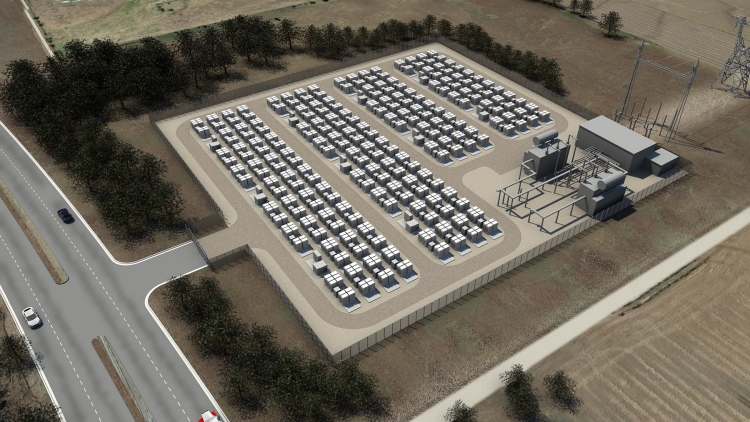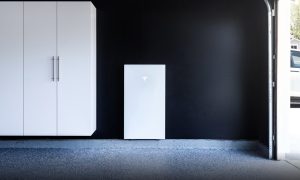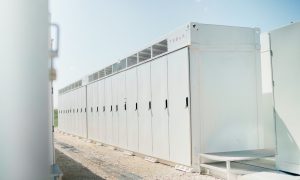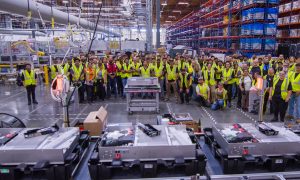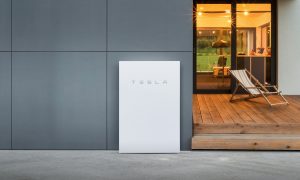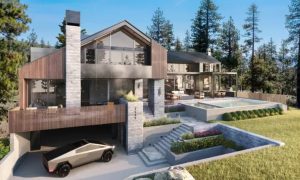News
Lithium Mining is a Hot Topic In Nevada Thanks to Tesla
Lithium mining is suddenly a hot topic in Nevada, where a local state senator is up in arms about a deal to import lithium from Mexico. Other sources exist.
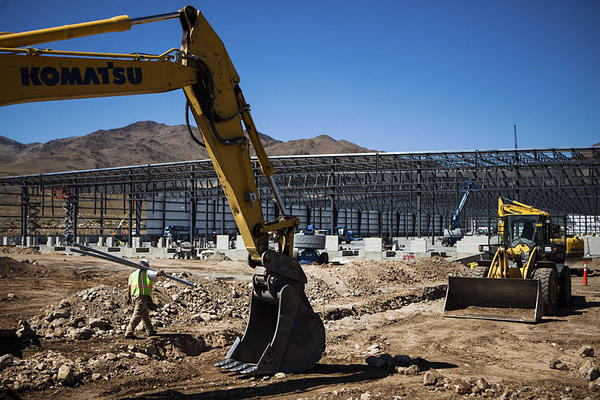
Lithium mining has become a hot topic in Nevada largely because of Tesla’s interest in sourcing lithium hydroxide, one of the main ingredients needed for Gigafactory scale production of lithium-ion batteries.
Tesla announced it had signed a deal with Canadian company Bacanora and British company Rare Earth Minerals towards the end of August. Bacanora is a minerals explorer, while Rare Earth Minerals owns Sonora Lithium Project. That partnership is designed to develop a “low-cost”, “sustainable” mining project in Northern Mexico based on clay deposits found in the region.
The Sonora mine does not exist yet, but could yield between 35,000 and 50,000 tons of lithium deposits annually. The deal will be extended and scaled up contingent on the mine’s ability to meet Tesla’s forecasts and actual output from its Gigafactory. The two Sonora project partners will need to find debt or equity to finance the operation and Tesla is permitted under the deal to participate in financing activities.
The state of Nevada has agreed to give Tesla almost a half billion dollars in tax incentives in order to lure the Gigafactory to the site north of Reno, which seems little enough considering the increase in economic activity the factory will bring to the state. But now, a Nevada politician, Democrat state senator Tick Segerblom, has tweeted, “Tesla to get lithium from Mexico – where’s Trump when you need him?”
tesla to get lithium from mexico – where's trump when we need him? $TSLA http://t.co/8NGT7OgjXp via @WSJ
— Tick Segerblom (@tsegerblom) August 28, 2015
That got the Las Vegas Sun involved. They contacted Elon Musk, who tweeted back that press interest in the story was “unwarranted” as the lithium deal was “not exclusive” and had “many contingencies”. He said that Tesla would “definitely” be interested in talking to local suppliers of lithium feedstocks. According to the Sun’s sources, developing lithium mines in the US is a lengthy process taking as much as 10 years, while lithium mining operations already located in Nevada are either too small or nearing the end of their planned lifetime.
@ScottLucasNV Lithium deal is not exclusive & has many contingencies. The press on this matter is unwarranted.
— Elon Musk (@elonmusk) September 2, 2015
Now up pops Nevada Sunrise Gold Corporation, which apparently is a played out gold mining operation. It announced on September 2nd that it has “entered into a letter agreement for an option to purchase” a site in Esmeralda County, which is in Nevada’s Clayton Valley. The company believes that area could hold lithium brine deposits in subterranean aquifers, based upon studies and reports made of the local area.
Meanwhile, researchers at the University of Wyoming report they have discovered an enormous supply of lithium at the Rock Springs Uplift, a geological feature in southwest Wyoming. Initial tests indicate the lithium-rich brine from a 25-square-mile area could contain 228,000 tons of the stuff. That’s enough to meet annual U.S. demand and is twice the amount available at Silver Peak in Nevada, which is the biggest domestic lithium producer today.
What has the University of Washington team excited is that the lithium at the Rock Springs Uplift can be processed more cheaply than the lithium found at other locations, due to a number of factors.
First, extracting the lithium from brine requires large quantities of soda ash (sodium carbonate). The Rock Springs Uplift site is located within 30 miles of the world’s largest industrial soda ash supplies, so the cost of transporting it to the production area will be minimal.
Second, magnesium must be removed from brine before it can be used for lithium recovery and that can be an expensive process. The brine from the Rock Springs Uplift reservoirs is lower in magnesium than at other sites. Less magnesium means less money to remove it.
Third, the brine must be heated and pressurized to release the lithium it contains. Because the Rock Springs Uplift brine is far underground, it is already at a higher pressure and temperature than brine at existing lithium operations. That factor may eliminate an expensive step in the process, resulting in significant cost savings.
The Chinese thought they had cornered the market for lithium when they locked up rights to much of the world’s lithium supply located in Bolivia a decade ago. But apparently, the demand has created interest in new sources of supply. Hopefully, all this interest in lithium will spur competition which could lead to lower prices. And that could spell lower battery prices for the electric cars and electrical storage batteries of the future.
Source: PV-Tech
News
These Tesla, X, and xAI engineers were just poached by OpenAI
The news is the latest in an ongoing feud between Elon Musk and the Sam Altman-run firm OpenAI.

OpenAI, the xAI competitor for which Elon Musk previously served as a boardmember and helped to co-found, has reportedly poached high-level engineers from Tesla, along with others from xAI, X, and still others.
On Tuesday, Wired reported that OpenAI hired four high-level engineers from Tesla, xAI, and X, as seen in an internal Slack message sent by co-founder Greg Brockman. The engineers include Tesla Vice President of Software Engineering David Lau, X and xAI’s head of infrastructure engineering Uday Ruddarraju, and fellow xAI infrastructure engineer Mike Dalton. The hiring spree also included Angela Fan, an AI researcher from Meta.
“We’re excited to welcome these new members to our scaling team,” said Hannah Wong, an OpenAI spokesperson. “Our approach is to continue building and bringing together world-class infrastructure, research, and product teams to accelerate our mission and deliver the benefits of AI to hundreds of millions of people.”
Lau has been in his position as Tesla’s VP of Software Engineering since 2017, after previously working for the company’s firmware, platforms, and system integration divisions.
“It has become incredibly clear to me that accelerating progress towards safe, well-aligned artificial general intelligence is the most rewarding mission I could imagine for the next chapter of my career,” Lau said in a statement to Wired.
🚨Optimistic projections point to xAI possibly attaining profitability by 2027, according to Bloomberg's sources.
If accurate, this would be quite a feat for xAI. OpenAI, its biggest rival, is still looking at 2029 as the year it could become cash flow positive.💰 https://t.co/pE5Z9daez8
— TESLARATI (@Teslarati) June 18, 2025
READ MORE ON OPENAI: Elon Musk’s OpenAI lawsuit clears hurdle as trial looms
At xAI, Ruddarraju and Dalton both played a large role in developing the Colossus supercomputer, which is comprised of over 200,000 GPUs. One of the major ongoing projects at OpenAI is the company’s Stargate program,
“Infrastructure is where research meets reality, and OpenAI has already demonstrated this successfully,” Ruddarraju told Wired in another statement. “Stargate, in particular, is an infrastructure moonshot that perfectly matches the ambitious, systems-level challenges I love taking on.”
Elon Musk is currently in the process of suing OpenAI for shifting toward a for-profit model, as well as for accepting an investment of billions of dollars from Microsoft. OpenAI retaliated with a counterlawsuit, in which it alleges that Musk is interfering with the company’s business and engaging in unfair competition practices.
Elon Musk confirms Grok 4 launch on July 9 with livestream event
News
SpaceX share sale expected to back $400 billion valuation
The new SpaceX valuation would represent yet another record-high as far as privately-held companies in the U.S. go.

A new report this week suggests that Elon Musk-led rocket company SpaceX is considering an insider share sale that would value the company at $400 billion.
SpaceX is set to launch a primary fundraising round and sell a small number of new shares to investors, according to the report from Bloomberg, which cited people familiar with the matter who asked to remain anonymous due to the information not yet being public. Additionally, the company would sell shares from employees and early investors in a follow-up round, while the primary round would determine the price for the secondary round.
The valuation would represent the largest in history from a privately-owned company in the U.S., surpassing SpaceX’s previous record of $350 billion after a share buyback in December. Rivaling company valuations include ByteDance, the parent company of TikTok, as well as OpenAI.
Bloomberg went on to say that a SpaceX representative didn’t respond to a request for comment at the time of publishing. The publication also notes that the details of such a deal could still change, especially depending on interest from the insider sellers and share buyers.
Axiom’s Ax-4 astronauts arriving to the ISS! https://t.co/WQtTODaYfj
— TESLARATI (@Teslarati) June 26, 2025
READ MORE ON SPACEX: SpaceX to decommission Dragon spacecraft in response to Pres. Trump war of words with Elon Musk
SpaceX’s valuation comes from a few different key factors, especially including the continued expansion of the company’s Starlink satellite internet company. According to the report, Starlink accounts for over half of the company’s yearly revenue. Meanwhile, the company produced its 10 millionth Starlink kit last month.
The company also continues to develop its Starship reusable rocket program, despite the company experiencing an explosion of the rocket on the test stand in Texas last month.
The company has also launched payloads for a number of companies and government contracts. In recent weeks, SpaceX launched Axiom’s Ax-4 mission, sending four astronauts to the International Space Station (ISS) for a 14-day stay to work on around 60 scientific experiments. The mission was launched using the SpaceX Falcon 9 rocket and a new Crew Dragon capsule, while the research is expected to span a range of fields including biology, material and physical sciences, and demonstrations of specialized technology.
News
Tesla Giga Texas continues to pile up with Cybercab castings
Tesla sure is gathering a lot of Cybercab components around the Giga Texas complex.

Tesla may be extremely tight-lipped about the new affordable models that it was expected to start producing in the first half of the year, but the company sure is gathering a lot of Cybercab castings around the Giga Texas complex. This is, at least, as per recent images taken of the facility.
Cybercab castings galore
As per longtime drone operator Joe Tegtmeyer, who has been chronicling the developments around the Giga Texas complex for several years now, the electric vehicle maker seems to be gathering hundreds of Cybercab castings around the factory.
Based on observations from industry watchers, the drone operator appears to have captured images of about 180 front and 180 rear Cybercab castings in his recent photos.
Considering the number of castings that were spotted around Giga Texas, it would appear that Tesla may indeed be preparing for the vehicle’s start of trial production sometime later this year. Interestingly enough, large numbers of Cybercab castings have been spotted around the Giga Texas complex in the past few months.
Cybercab production
The Cybercab is expected to be Tesla’s first vehicle that will adopt the company’s “unboxed” process. As per Tesla’s previous update letters, volume production of the Cybercab should start in 2026. So far, prototypes of the Cybercab have been spotted testing around Giga Texas, and expectations are high that the vehicle’s initial trial production should start this year.
With the start of Tesla’s dedicated Robotaxi service around Austin, it might only be a matter of time before the Cybercab starts being tested on public roads as well. When this happens, it would be very difficult to deny the fact that Tesla really does have a safe, working autonomous driving system, and it has the perfect vehicle for it, too.
-

 Elon Musk1 week ago
Elon Musk1 week agoTesla investors will be shocked by Jim Cramer’s latest assessment
-

 News2 weeks ago
News2 weeks agoTesla Robotaxi’s biggest challenge seems to be this one thing
-

 Elon Musk1 day ago
Elon Musk1 day agoElon Musk confirms Grok 4 launch on July 9 with livestream event
-

 News2 weeks ago
News2 weeks agoWatch the first true Tesla Robotaxi intervention by safety monitor
-

 News5 days ago
News5 days agoTesla Model 3 ranks as the safest new car in Europe for 2025, per Euro NCAP tests
-

 Elon Musk2 weeks ago
Elon Musk2 weeks agoA Tesla just delivered itself to a customer autonomously, Elon Musk confirms
-

 Elon Musk2 weeks ago
Elon Musk2 weeks agoxAI welcomes Memphis pollution results, environmental groups push back
-

 Elon Musk2 weeks ago
Elon Musk2 weeks agoElon Musk confirms Tesla Optimus V3 already uses Grok voice AI

